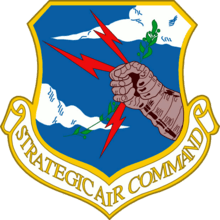308th Air Refueling Squadron
The 308th Air Refueling Squadron is an inactive United States Air Force unit. It was last assigned to the 2d Bombardment Wing at Hunter AFB, Georgia. It was inactivated on 1 March 1960.
| 308th Air Refueling Squadron | |
|---|---|
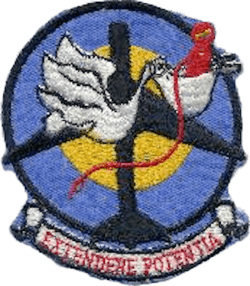 308th Air Refueling Squadron Patch | |
| Active | 1942–1944, 1945–1946, 1953–1960 |
| Country | |
| Branch | |
| Type | Air Refueling |
| Motto(s) | EXTENDERE POTENTIA (Extend Power) |
| Engagements | American Theater of World War II |
| Decorations | Air Force Outstanding Unit Award |
The squadron was first active as the 318th Bombardment Squadron, an operational training unit and replacement training unit under Second Air Force during World War II.
In 1945, the 8th Tactical Reconnaissance Squadron was activated as a demonstration unit for air ground support exercises.
In 1985 the three squadrons were consolidated into a single unit.
History
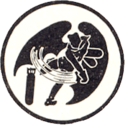
The 318th Bombardment Squadron was established in early 1942 as a Boeing B-17 Flying Fortress heavy bombardment squadron.[1] It was part of Second Air Force as a heavy bomber Operational Training Unit (OTU).[2] The OTU program involved the use of an oversized parent unit to provide cadres to "satellite groups".[3]
The squadron was assigned primarily to airfields in the Pacific Northwest training new units, then becoming a Replacement Training Unit (RTU). RTUs were oversized units that trained individual pilots or aircrews.[3] It was transferred along with its parent group to Third Air Force in November 1943.[2] However, standard military units, based on relatively inflexible tables of organization were proving less well adapted to the training mission. Accordingly, a more functional system was adopted in which each base was organized into a separate numbered unit.[4] In this reorganization it was replaced along with other units at Avon Park AAF by the 325th AAF Base Unit (Replacement Training, Bombardment, Heavy) and was inactivated.
In 1945, the 8th Tactical Reconnaissance Squadron was activated as a demonstration unit for air ground support exercises and served in this capacity in the early postwar era. It was disbanded in 1948.[5]
The 308th Air Refueling Squadron, Medium was activated in 1953 at Hunter AFB, Georgia to provide air refueling of United States Air Force (Primarily Boeing B-47 Stratojet) aircraft using KC-97 Stratotankers on a worldwide basis. The squadron deployed to Sidi Slimane AB, Morocco in 1956. It maintained one third of its aircraft on alert in a test of Strategic Air Command's alert plan later that year.[6] The squadron earned an Air Force Outstanding Unit Award for its performance in this test.[7] In 1959 it was reassigned to the 2d Bombardment Wing at Hunter when the 308th Bombardment Wing became non-operational.[6] It was discontinued in 1960 as Boeing B-52 Stratofortresses supported by Boeing KC-135 Stratotankers assumed the greater portion of the strategic bombardment mission.
The three units were consolidated in 1985 as the 308th Air Refueling Squadron but have not been active since.
Lineage
318th Bombardment Squadron
- Constituted as 318th Bombardment Squadron (Heavy) on 28 January 1942
- Activated on 15 June 1942
- Inactivated on 1 May 1944[1]
- Consolidated on 19 September 1985 with 8th Tactical Reconnaissance Squadron and 308th Air Refueling Squadron as 308th Air Refueling Squadron, Heavy[8] (remained inactive)
8th Tactical Reconnaissance Squadron
- Constituted as 8th Tactical Reconnaissance Squadron on 30 June 1945
- Activated on 15 July 1945
- Inactivated on 3 February 1946
- Disbanded on 8 October 1948[5]
- Reconstituted on 19 September 1985 and consolidated with 308th Air Refueling Squadron and 318th Bombardment Squadron as 308th Air Refueling Squadron, Heavy[8] (remained inactive)
308th Air Refueling Squadron
- Constituted as 308th Air Refueling Squadron, Medium on 15 April 1953
- Activated on 8 July 1953
- Inactivated on 1 March 1960
- Consolidated on 19 September 1985 with 8th Tactical Reconnaissance Squadron and 318th Bombardment Squadron as 308th Air Refueling Squadron, Heavy[8] (remained inactive)
Assignments
- 88th Bombardment Group, 15 June 1942 – 1 May 1944[1]
- 74th Tactical Reconnaissance Group, 15 July 1945[5]
- 69th Reconnaissance Group, 7 November 1945 – 3 February 1946[5]
- 308th Bombardment Wing, 8 July 1953[6]
- 38th Air Division, 15 June 1959
- 2d Bombardment Wing, 1 July 1959 – 1 March 1960[9]
Stations
|
|
Aircraft
|
|
|
Awards and Campaigns

- Air Force Outstanding Unit Award 1 November 1956 – 1 February 1957
.png)
- American Theater of World War II
References
Notes
- Maurer, Maurer, ed. (1982) [1969]. Combat Squadrons of the Air Force, World War II (PDF) (reprint ed.). Washington, DC: Office of Air Force History. p. 388. ISBN 0-405-12194-6. LCCN 70605402. OCLC 72556.
- Maurer, Maurer, ed. (1983) [1961]. Air Force Combat Units of World War II (PDF) (reprint ed.). Washington, DC: Office of Air Force History. p. 154. ISBN 0-912799-02-1. LCCN 61060979.
- Craven, Wesley F; Cate, James L, eds. (1955). "Introduction". The Army Air Forces in World War II. Vol. VI, Men & Planes. Chicago, Illinois: University of Chicago Press. p. xxxvi. LCCN 48-3657.
- Goss, William A (1955). "The Organization and its Responsibilities, Chapter 2 The AAF". In Craven, Wesley F; Cate, James L (eds.). The Army Air Forces in World War II. Vol. VI, Men & Planes. Chicago, Illinois: University of Chicago Press. p. 75. LCCN 48-3657.
- Maurer, Combat Squadrons, p. 49
- Ravenstein, Charles A. (1984). Air Force Combat Wings, Lineage & Honors Histories 1947–1977. Washington, DC: Office of Air Force History. pp. 156–158. ISBN 0-912799-12-9.
- AF Pamphlet 900-2, Unit Decorations, Awards and Campaign Participation Credits Department of the Air Force, Washington, DC, 15 June 1971, p. 298
- Department of the Air Force/MPM Letter 662q, 19 Sep 85, Subject: Reconstitution, Redesignation, and Consolidation of Selected Air Force Tactical Squadrons
- Ravenstein, pp. 7–9
Bibliography
![]()
- Craven, Wesley F; Cate, James L, eds. (1955). The Army Air Forces in World War II. Vol. VI, Men & Planes. Chicago, Illinois: University of Chicago Press. p. xxxvi. LCCN 48003657.
- Maurer, Maurer, ed. (1983) [1961]. Air Force Combat Units of World War II (PDF) (reprint ed.). Washington, DC: Office of Air Force History. ISBN 0-912799-02-1. LCCN 61060979.
- Maurer, Maurer, ed. (1982) [1969]. Combat Squadrons of the Air Force, World War II (PDF) (reprint ed.). Washington, DC: Office of Air Force History. ISBN 0-405-12194-6. LCCN 70605402. OCLC 72556.
- Ravenstein, Charles A. Air Force Combat Wings, Lineage & Honors Histories 1947–1977. Washington, DC: Office of Air Force History. ISBN 0-912799-12-9.
- AF Pamphlet 900-2, Unit Decorations, Awards and Campaign Participation Credits Department of the Air Force, Washington, DC, 15 June 1971
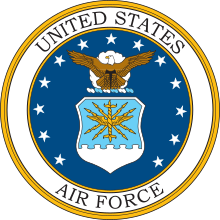
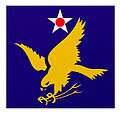
.svg.png)
